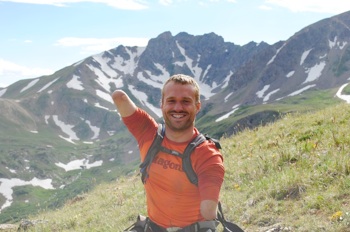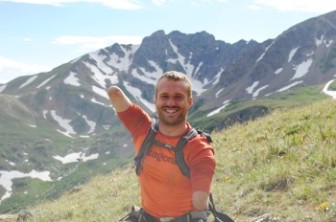
Ever since childhood, Kyle has relentlessly pursued life without giving in to a distorted view of himself. Those looking from the outside, unfamiliar with Kyle’s confident nature and refusal to give up on anything, might be forgiven their limited view of his capabilities and future accomplishments.

Kyle’s grandmother taught him an enduring truth that he carried into adulthood, “God made you special, and it’s okay to be different.” Through the support of his parents and his faith, Kyle was determined to not buy into limitations of any kind, “Even though I was born with much shorter limbs than the average person, I know that I was not born to be an inferior individual. I was born to succeed, not to allow physical limitations to stand in the way of my dreams.”1
Practically defying the law of physics, Kyle became a champion high school wrestler in Georgia and would one day summit Mount Kilimanjaro to honor a slain American soldier. Today, he travels the country giving motivational speeches like the one he recently gave to honor the best 2014 high school athletes in southeast Missouri.
Kyle is not the first person who has chosen to not view himself through purely human eyes and cultural attitudes about the body. Mary Baker Eddy experienced long term illness, lived many years in poverty and was often homeless. To make a bad situation worse, she bumped up against the limiting and burdensome 19th century societal and cultural attitudes towards women. At midlife, she experienced a complete healing of the illnesses that had plagued and limited her through a new view of God and an understanding of how Jesus healed.
Eddy would never again view the material body as defining or limiting one’s self-expression. She emphasized this point in a letter written when she was 80 years old, “life is in putting off the limitations [self-imposed human limitations] and putting on the possibilities and permanence of Life [God].”2
Helen Keller lived a life of accomplishment. Not one to complain about her inability to see or to hear, she expressed a great love and compassion for others. Her own spiritual search would lead her to acknowledge having, “a vivid consciousness of the complete being within me. Each day comes to me with both hands full of possibilities…”3 Probably to the surprise of her classmates, Helen graduated Cum Laude from prestigious, Radcliffe College in Cambridge, MA.
In a very real sense, what appears to be a limiting material circumstance or condition, is a distorted – often purely human – view of one’s capabilities and life purpose. Yet, each of these individuals discovered a spiritual essence to life; an internal uprising that rejected the human limitations that their bodies and their societies tried to place on them. As a result, their life’s work was – and in Kyle’s case is – uninhibited by the body.
If they can do it, so can we.
Steve Drake is a Health writer focused on the growing evidence that what we think directly influences our health. He is also the media and legislative representative for Christian Science in Missouri.
Footnotes:
- No Excuses: the true story of a congenital amputee who became a champion in wrestling and in life by Kyle Maynard
- Science and Health by Mary Baker Eddy
- Helen Keller’s Faith
